Pacific Islands Standards Week helps build capability for standards use across the Pacific
The event brought together over 40 Pacific Island representatives to expand their knowledge, expertise, skills and capability to help further advance quality infrastructure, standards and conformance systems used across the region.
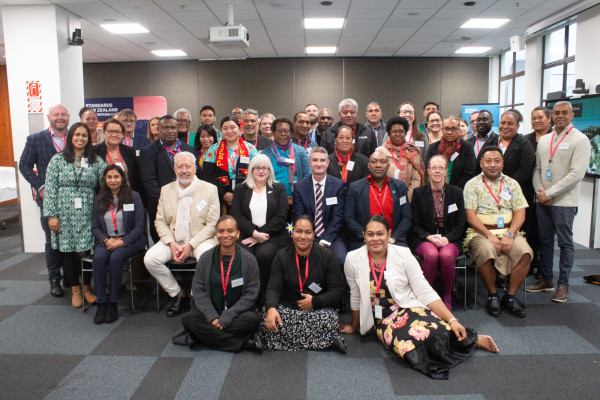
Only the second event ever of its kind, the week included a full programme of over 20 guest speakers from across New Zealand and Australia’s standards and conformance systems, covering topics related to building & construction, climate change resilience, metrology, as well as drafting and adoption of standards. Attendees came from 13 out of the 18-member Pacific Islands Standards Committee (PISC) and represented mostly ministries and government departments across trade, commerce, infrastructure, utilities and more.
Developed in 2021, PISC predominately represents the distinct needs of smaller developing nations in the Pacific Islands, which are also likely to be those most heavily impacted by sea level rises anticipated with climate change. Its ultimate goal is to foster economic development, enhance public safety and improve the overall quality of life in the Pacific region.
Members include the Cook Islands, Federated States of Micronesia, Fiji, French Polynesia, Kiribati, Nauru, New Caledonia, Niue, Palau, Papua New Guinea, Republic of the Marshall Islands, Samoa, Solomon Islands, Tonga, Tuvalu, Vanuatu, New Zealand and Australia. The Secretariat and administration of activities is shared between member bodies.
Convenor for New Zealand’s representation on AI standards, Craig Pattison, who helped facilitate the event says, ‘The second Pacific Islands Standards Week has been a resounding success, fostering collaboration and knowledge exchange that will have a lasting impact on standards development and implementation across the Pacific region.’
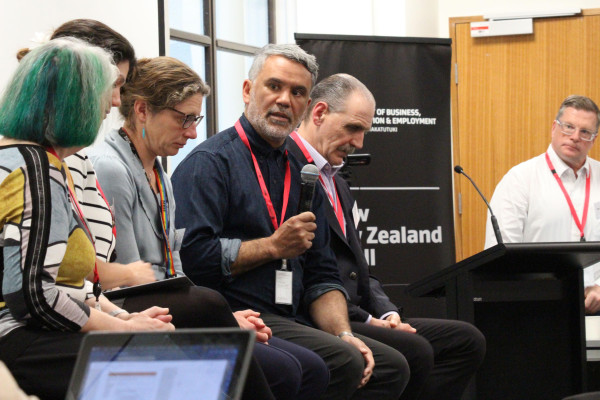
Panel discussion with Dr Ann Smith, Cindy Varnier, Katie Symons, Prof Derek Kawiti, and Brian Fitzgerald
The event was funded by the Ministry of Foreign Affairs and Trade with support from Pacific Quality Infrastructure (PQI), an international initiative that brings together organisations and processes to help improve the quality of goods and services manufactured in the Pacific, consumed locally, and exported to overseas markets, by promoting access to Quality Infrastructure (QI). QI comprises all services provided by public or private organisations, relevant legal and regulatory frameworks, and practices related to standardisation, metrology, accreditation and conformity assessment.
What was covered during the week?
We were privileged to have many industry experts volunteer their time and contribute to presentations and workshops. These individuals are those at the forefront of both shaping and using standards.
PISC Meeting – strategy planning on priorities
The week gave opportunity for a face-to-face meeting of the Pacific Islands Standards Committee to progress strategic planning. Currently there are no standards that have originated in the Pacific nor developed for regional use and this is an area PISC is looking to focus on. Strategic planning helped agree and plan priorities.
Drafting standards
Where to begin with drafting standards? That was the topic covered in an interactive and pragmatic workshop led by Standards Australia, who did a deep dive into the process, steps and requirements to develop a standard from scratch using the consensus-based approach aligned with international standards setting bodies like ISO.
Technical Committee meetings
This session offered time to build upon the work already begun at last year’s inaugural PISC meeting with plans to develop food and beverage related standards. The aim is to help define and demonstrate quality and give health and safety assurance for export of Cassava and other local produce. A second technical committee considered standards for construction, a key theme of the event.
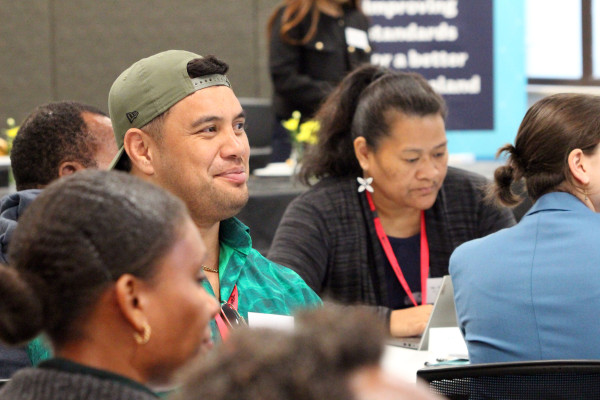
Construction and infrastructure
There were deep dives into some of the standards used across New Zealand’s building and infrastructure sectors with particular interest in the newly published NZS 3910 for construction contracts. These are standards of particular interest to Pacific Island communities looking to improve not just the quality of buildings but associated health and safety and climate change adaptation. Recognising the importance of integrating traditional knowledge with modern standards was explored with examples given of Māori architecture, showing not just the need for standards but also the potential for localised modified adoptions of international standards and domestic standards that retain and integrate cultural aspects.
Energy efficiency
Energy efficiency and the work of Energy Efficiency and Conservation Authority helped delegates understand how Minimum Energy Performance Standards (MEPS) have helped ensure only appliances that meet strict requirements around energy use are able to enter New Zealand markets. Considerable energy savings can be had through MEPS including reducing both running costs and carbon emissions. Aligning Pacific energy standards with international ones, particularly in renewable energy sectors, was seen as a way to accelerate progress.
Metrology and fair trade
Metrology standards used by Trading Standards and the Measurement Standards Laboratory of New Zealand (MSL)m which is New Zealand's national metrology institute, helped delegates appreciate the role they play in ensuring customers get what they are paying for. They also create a level playing field for domestic and international trade for confidence in exports. With New Zealand’s food and fibre exports bringing in considerable export revenue, the Ministry of Primary Industries introduced the standards sitting behind export products and the Trans-Tasman Mutual Recognition Agreement which uses standards to create a fair and open market between Australia and New Zealand.
Climate change
Climate change was covered, including insight into how standards play a role in measuring life-cycle carbon emissions of buildings, including both operational and embodied. An introduction to the 17-climate change management ISO standards that support climate change mitigation and adaptation and green finance, showed how these work across diverse sectors, can be used for accreditation, support export and evidence meeting the United Nation’s Sustainable Development Goals. For many PISC member nations there is a need to develop a baseline and understand key vulnerabilities and from this develop prioritisation plans that integrate climate change work into broader policies and programmes. Leveraging standards and building a proactive community is a good place to start, with examples of projects underway by the Vanuatu Ministry of Climate Change.
Adopting international standards
A deep dive session on international standards adoptions included examples of how adoption of international standards have been crucial to speed up and enable New Zealand’s advancement on the use of and integration of hydrogen in our energy landscape.
Stakeholder engagement and communication
It is imperative that stakeholders are engaged to ensure effective collaboration and input, hence a full morning was spent on practical guidance and exercises in relation to effective stakeholder engagement and communicating the importance of standards across sectors using a variety of channels to encourage user and committee participant buy-in. Some delegates really brought into perspective the environments they operate in and how communication was much more challenging in their regions. For example, those in Papua New Guinea who try to bring standardisation across hundreds of islands use AM radio to reach those more isolated and where there is no electricity. Storytelling came through as a key element of communication and conveying the reality and relatability of the issues standards seek to solve.
Introduction to BRANZ
A field trip to the impressive laboratories and testing and research facility at Building Research Association NZ (BRANZ) helped show standards in action. Attendees learnt about material property and structural tests and many BRANZ representatives continue to be active contributors to many New Zealand construction-related standards.
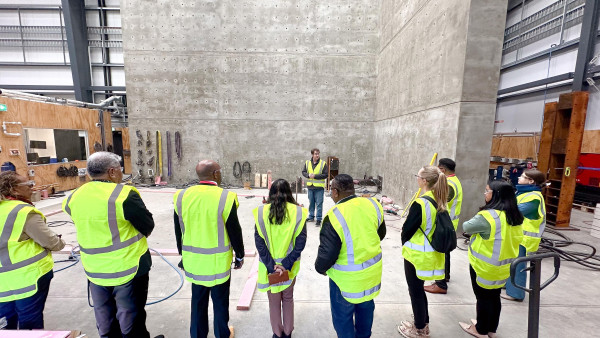
Delegates attend the purpose-built fire research and testing laboratory developed at Judgeford, Wellington.
Where to from here
The insights and outputs from the week will play a crucial role in helping Pacific Islands enhance their standardisation practices and processes.
Feedback shows many of the PISC member-nations are dealing with the same challenges and looking to incorporate similar solutions. Future focuses include similar emerging technologies to New Zealand like EVs and smart technologies, plus energy saving, storage and renewable energy adoption, particularly solar and wind. Likewise, challenges exist in integrating and using standards including funding and training, awareness and general understanding.
Most attendees agreed their nations had poor energy efficiency that wasn’t helped by infrastructure and cost and felt their countries were not especially well prepared to handle the impacts of climate change. Disaster preparedness was a major priority for them followed by coastal protection, renewable energy and water and food security.
By far, it was felt that local community engagement, education and capacity building were the most effective strategies for enhancing climate resilience in the Pacific Islands, and international partnerships was recognised as being of utmost importance to support this in conjunction with local knowledge.
The sense of unity and learning from each other was deeply felt during the week as was the agreement to look to utilise international good practice to solve challenges we share not just across the Pacific but globally. And that’s why events like this are so important, to enable sharing, capability building so we can work together with a sense of kotahitanga, stronger together.
In the words of Djamil Abdelaziz, PISC Chair: 'I can testify that we've all had an extraordinary week, and that we're making enormous progress in our ability to work as a team. This progress is the direct result of the bonds we've forged with each other, and the respect and esteem we show each other at every meeting. We're different, but we're united, and that's what counts.'
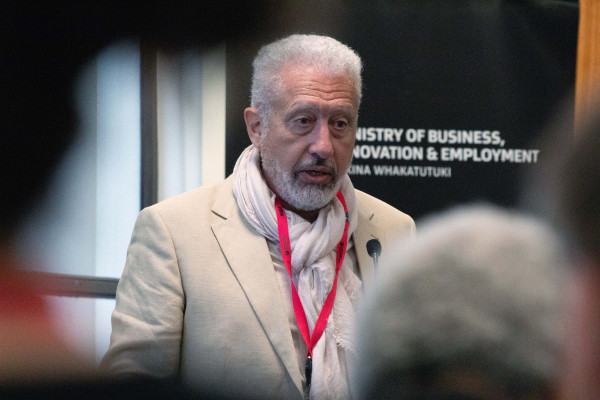
PISC Chair Djamil Abdelaziz from New Caledonia
